One of my prized pieces of equipment in the print shop is a numbering machine. It’s an ingenious piece of kit: every time the press makes an impression, the number increments. I’ve used it for raffle tickets and trading cards and, this season, for our This Box is for Good boxes.
There’s one right way to orient the numbering machine on the press, at 90° to the lockup, positioned so that the rollers strike the No. last. Orienting it some other way results in incomplete inking, and/or skipped numbers.
To help me remember this, I made a cheat sheet.
Three items in my inbox this week, all opportunities to learn something new.
Climbing Toddlers
At Red Rock Climbing Wall, there’s a new Toddler Power Hour every Friday from 4:30 to 5:15, starting February 16th, 2024. From the announcement:
An action-packed session of supervised climbing and games led by our very own, Matt, Nicole, and Audrey. Designed specifically for toddlers, this program will provide a fun and engaging experience that will leave your child wanting more.
I can attest to awesomeness of Red Rock. Last summer I climbed there myself, and Matt made the experience fun, safe, and challenging. Matt is also Lisa’s trainer, and by virtue of my own trainer being away for a few weeks, I worked out with Lisa and Matt twice, and had my ass pleasantly kicked both times: Matt’s a funny, caring, compassionate person, and one of the most engaged dads I know. Your toddler will be in good hands.
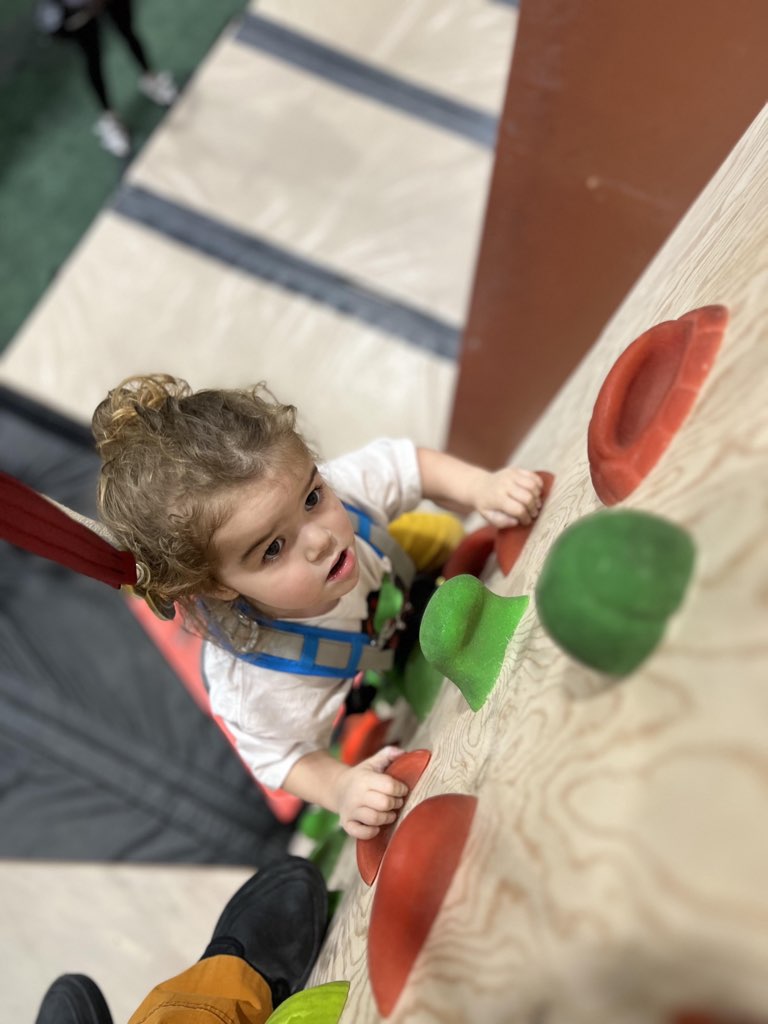
Audrey climbs at Red Rock Climbing Wall.
Writing Pastiches
The Al Purdy A-frame Association is holding a two-date online workshop with writer John Barton, A-frame Pastiches: Writing in Tribute to Al Purdy, on March 23 and April 6, 2024:
Together we’ll illuminate various ways we can respond creatively to the work of another poet, with Purdy’s poems in the hot seat. To illustrate, John has written examples of five forms to get the ball rolling and the pens moving: a pastiche, a glosa, a cento, a sonnenizio and a remix, each using lines from Purdy’s work.
Here’s a stanza from Purdy’s Listening to Myself to get your started:
— the loss of love
that comes to mean more
than the love itself
and how explain that?
— a still pool in the forest
that has ceased to reflect anything
except the past
— remains a sort of half-love
that is akin to kindness
and I am angry remembering
remembering the song of flesh
to flesh and bone to bone
the loss is better
See also 3 Al Purdy’s, one of my favourite songs by Bruce Cockburn.
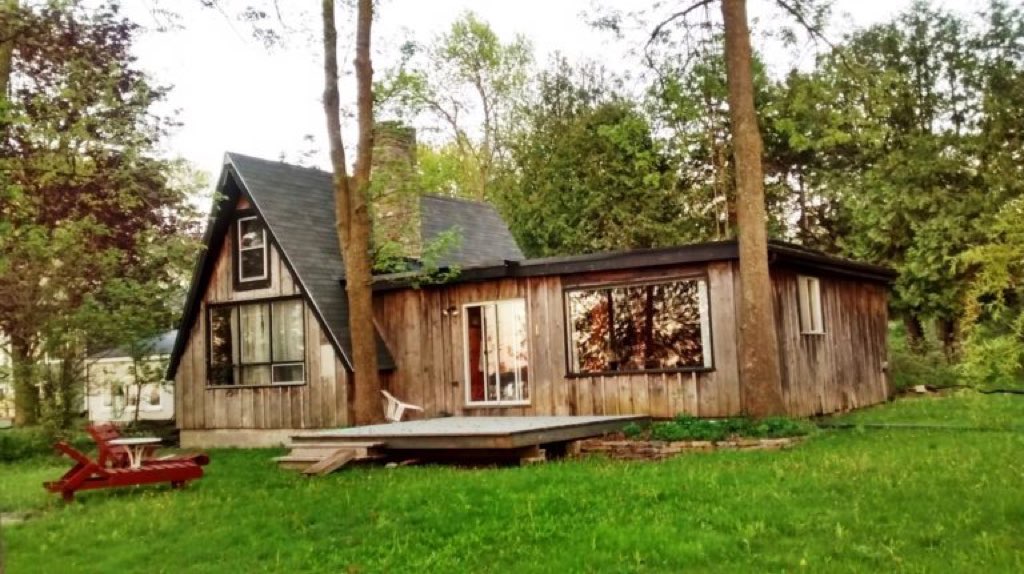
The Al Purdy A-Frame cottage, from Prince Edward County Arts Council.
Making Magazines
magCulture, a London-based blog cum magazine shop cum consultancy cum magazine event planner, is holding an online magazine-making masterclass called The Flatplan on March 2 and 3, 2024:
We’ve brought together again some of the best indie magazine-makers to provide a complete introduction to creating a successful publication, along with specialist printers and distributors. You’ll leave with the knowledge needed to nurture an abstract idea into a real-life magazine others will want to buy, read and enjoy! Ticketholders will also have exclusive access to videos of both days of talks for future reference (and so that people in other time zones can still benefit from the sessions).
I love the magCulture blog; second only to Frab’s, it’s my go-to source for what’s new and scintillating in the world of print magazines. The list of speakers at the masterclass is impressive. The world needs more magazines. Maybe the you’re the one to start a new one?
I’ve been using Readwise Reader since it was released in beta, and I love it more than a little: it’s an all-on-one reader app for RSS feeds, email newsletters, PDFs, and ebooks, with helpful tools for annotating, sharing, summarizing, filtering, and searching. Here’s what it looks like:
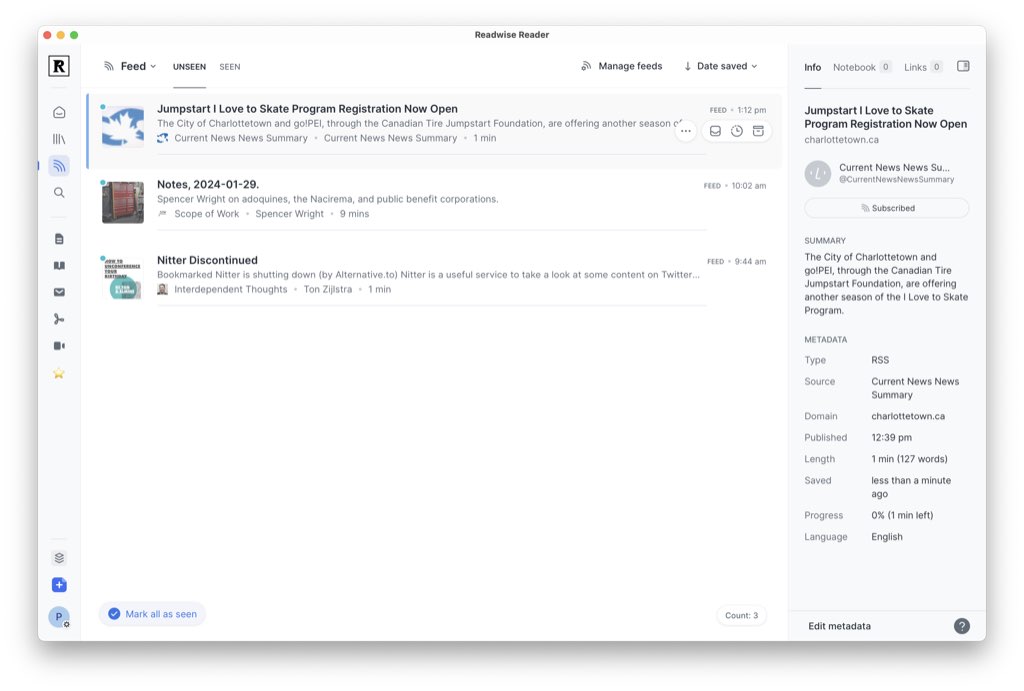
This morning in my Reader I found Re-Noted: 6 Ways to Use a Diary, a rumination by Jillian Hess on the ways we diarize. I loved the scans of sundry diaries—Alan Rickman, in particular—and the link to a YouTube tutorial from Lynda Barry about “a method of remembering.”
Another item in my Reader this morning was from Readwise itself, an issue of Wisereads, the project’s newsletter—an uncommonly rich and useful newsletter—that showcases things you might want to use Reader to read. Among those was Dan Wang’s 2023 letter, a letter that starts:
The trunk of an elephant might feel cool to the touch. Not what one expects, perhaps, from 200 pounds of writhing muscle, strong enough to uproot a tree, which tapers down to two “fingers,” giving it enough delicacy to detect the ripest berry on a shrub, and pluck it. Feeling an elephant’s trunk draws you to her other great feature: melancholic eyes that are veiled by long and dusty lashes. This combination of might with the suggestion of serene contemplation is surely the reason that elephants seem to embody a special state of grace.
I encountered several of these big beasts on a trek through the mountains of northern Thailand in December. The occasion was a “walk and talk” organized by Kevin Kelly and Craig Mod, who launched a dozen people on a 100 kilometer walk over seven days from Mount Inthanon to the center of Chiang Mai.
Yet another item, also from Readwise, was an update on Reader itself. One of the new features announced therein was the ability to create “Bundles” in Reader, a collection of links to things that you can then one-click publish to a public URL:
Somewhat experimental: You can now create themed collections of documents (aka “bundles”) with pretty landing pages for easily sharing with others. To create a bundle, first save a filtered view in the web app, click the down chevron next to its name, and select Enable public link. You can optionally add a description and a cover image to spice up the public landing page. When a recipient hits the Open in Reader call-to-action, a filtered view will be created in their account populated with these documents.
To illustrate a use of the feature, there was a link to one such bundle, Dan & Meghan Sabbatical. The image illustrating that bundle? An elephant. And one of the stories in the bundle, Where have we been?! Chiang Mai, Thailand, explained:
Chiang Mai is known for its beautiful landscapes and mountainous terrain. It’s also the home of Asian elephants! Ever since I was a little girl and found out that my brother got to ride elephants in Taiwan (where my mom is from) before I was born, I’ve always wanted to go for an elephant ride. Elephants are such majestic, enormous creatures that it seemed like one of those things you have to do in a lifetime. So we signed up to spend a morning with the Elephants at Ran-Tong Elephant Save & Rescue Centre. They had a great mission to save and care for elephants that have been victims of cruel treatment while working at logging sites and the like.
Dan was a little less excited than I was to see and ride the elephants, but once we got there he was just as wide-eyed as I was! They are amazing creatures, so giant yet so gentle.
This brought to mind our own trip, 21 years ago, to Chiang Mai where we too rode an elephant.
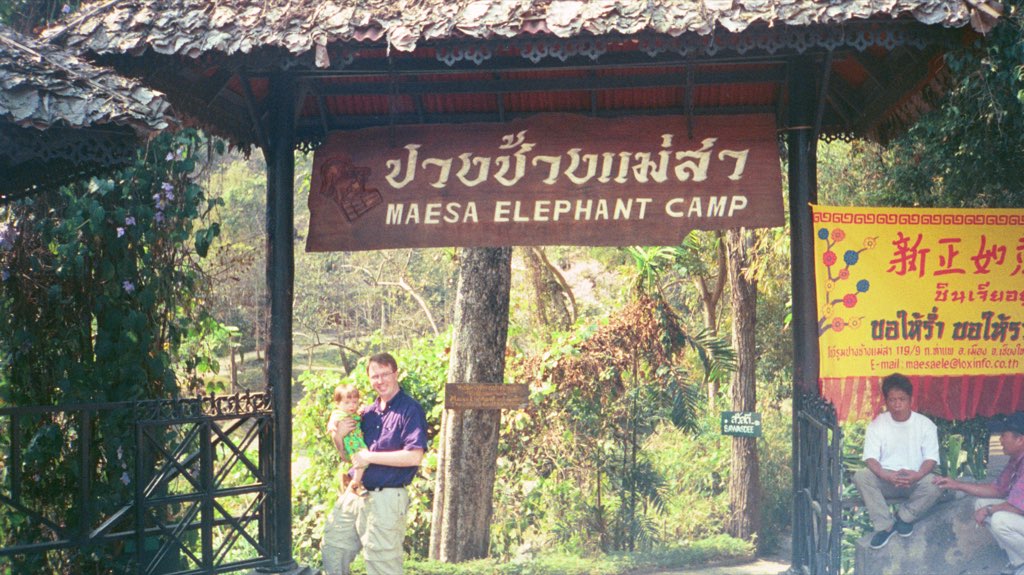
Suffice to say, I had elephants on my mind this morning.
During a brief lull in my Reader reading, a question occurred to me: where is the nearest elephant?
In other words, if I wanted to lay hands on an elephant right now, how far would I need to travel.
There is a thing for every happenstance thought, and elephants-in-captivity is no different: The Elephant Database came to my aid, a result of a search for “elephants in Eastern Canada.”
The entry that immediately jumped out at me was the elephant at Anil Canada Ltd. hardboard plant in East River, Nova Scotia. Because, well, that didn’t make any sense to me at all.
My East River elephant curiosity led me to the Barbara Hinds fonds in the library at Halifax’s Dalhousie University, and specifically to the section labelled File MS-2-130, Box 3, Folder 3 - Newspaper clippings and other material about the Anil elephant:
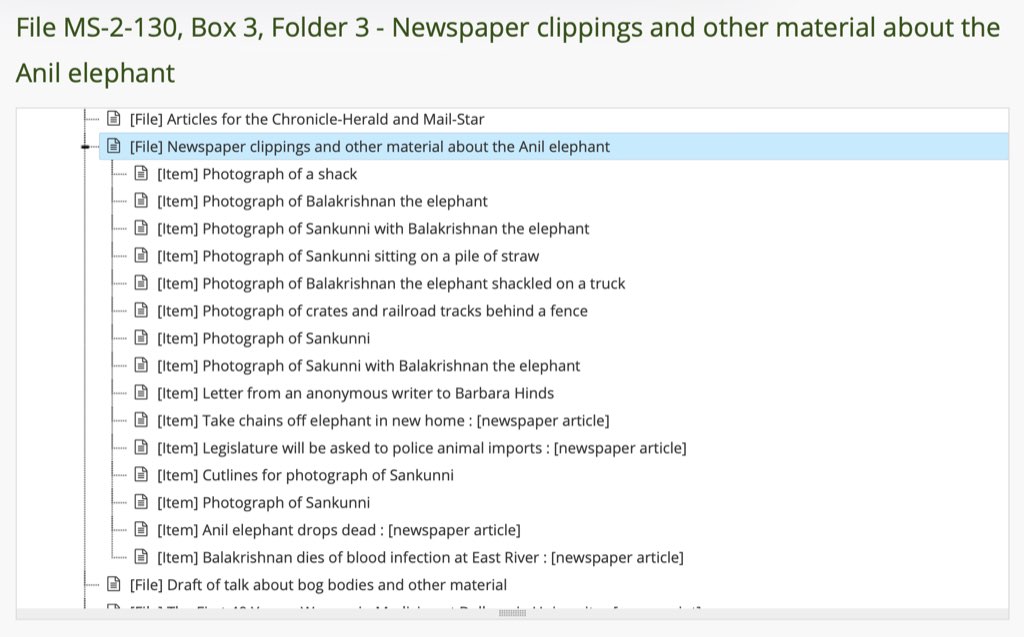
Barbara Hinds was a Halifax journalist. She worked at the Chronicle Herald and Mail Star for 33 years, and those documents, all related to her reporting, tell the story of how, in 1967, an elephant named Balakrishnan was brought from India, with its mahout Sankunni, as a cruel publicity stunt to mark the opening of an India-backed hardboard plant:
Before being brought to Canada as an advertising gimmick, Balakrishnan worked in South India. When he was selected for emigration to Canada, his mahout, Sankunni had to go with him. They trained and worked together for five years, and traditionally, an elephant and his keeper stay together until death separates them. So, Sankunni, speaking the little known dialect of Malayalam, left his family behind and brought Balakrishnan to a life of leisure in Nova Scotia. To embark on board ship for the trip to Canada, the team of giant animal and small, lion-hearted man walked 110 miles across the hot India countryside. They took five days to travel the distance to the Bombay dockside.
After being moved from Halifax, his port of entry, to East River, Lunenburg County, Balakrishnan lived in idleness. He did no work and he walked little more than a few paces. He was first chained to a great spruce tree at the edge of the woods near a railway crossing where the trains whistled their approach.
People were able to visit him and feed him bananas, which he relished during the summer of 1967. A neighbor Mrs. Raymond Meisner, used to warm his drinking water for him until he/ was moved away into a shanty near the plant’s main entrance (which was quieter) and where he was still accessible to an admiring public during the fall.
Balakrishnan eventually succumbed to either the harsh conditions, the Canadian winter, or something else—his cause of death wasn’t conclusive:
Balakrishnan, Anil’s white elephant, dropped dead in his shackles at 5 o’clock this morning in his shed at East River. The 25-year old former working elephant had been sick for a week and was
visited by a veterinarian surgeon during the weekend and given an injection. For the past seven days, Balakrishnan had not eaten, to the concern of his keeper,
Sankunni. Yesterday, he drank a lot of water, but still refused to eat.
The story of Balakrishnan and Sankunni is told well in a 2019 National Film Board film, Balakrishna, which uses the reminiscences of Winton Cook, 13 at the time of their arrival in Canada, with animation combined with archival video and photos to demonstrate both the cruelty of the endeavour, and how Balakrishnan played an important role in one boy’s teenaged life.
But back to Barbara Hinds.
Also in her archives, under the section Personal notes of Barbara Hinds, is a collection of her diaries, like this one. It’s fascinating: a view into the personal and working life of a Haligonian journalist living in my lifetime.
There is a page of Charles Darwin quotes:
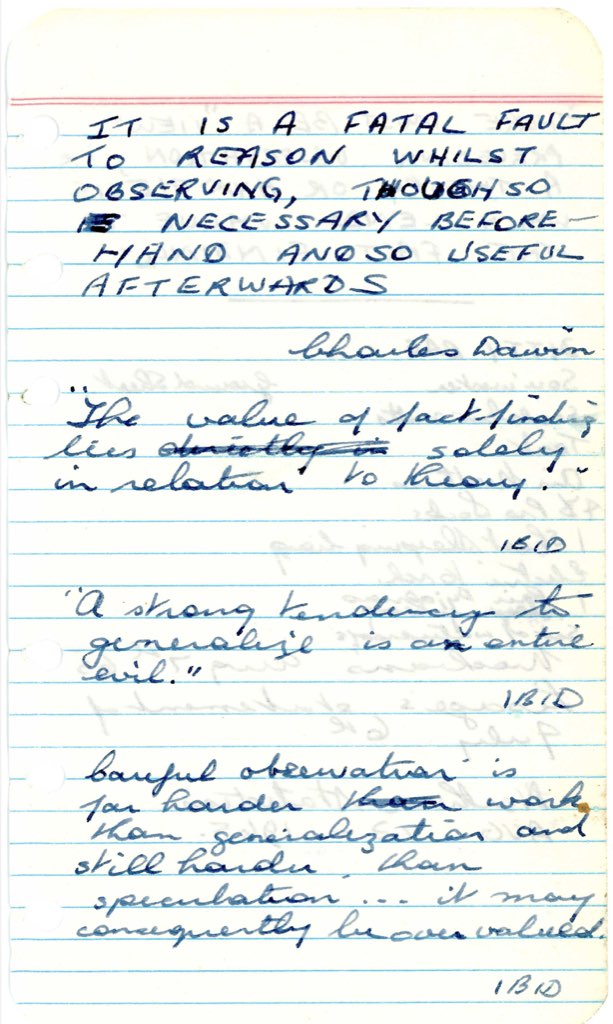
Dalhousie University Archives,
Diary of Barbara Hinds, Accession 2009-003
And a shopping list:
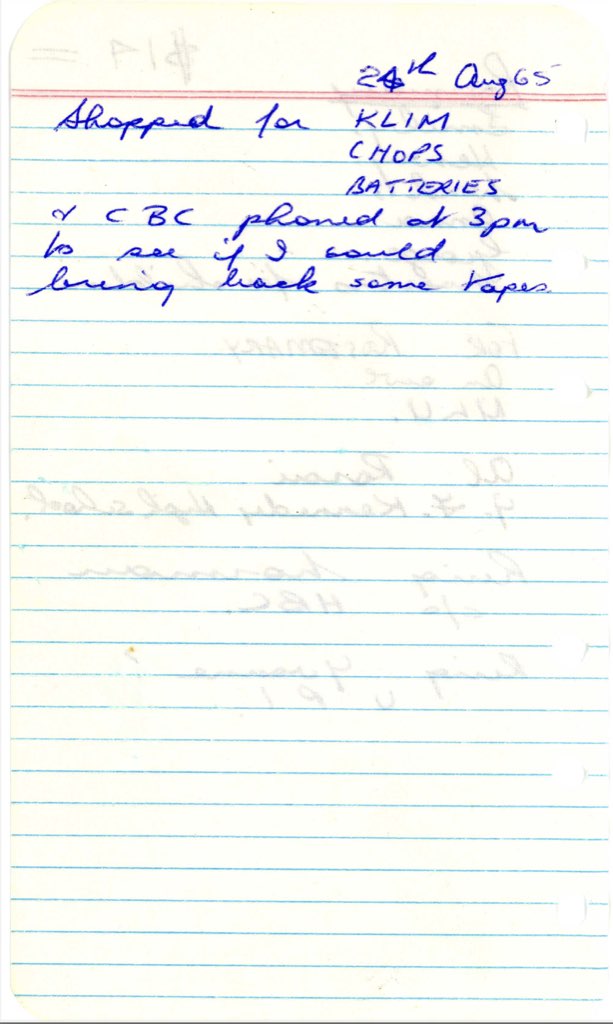
Dalhousie University Archives,
Diary of Barbara Hinds, Accession 2009-003
Notes from her reporting in the north:
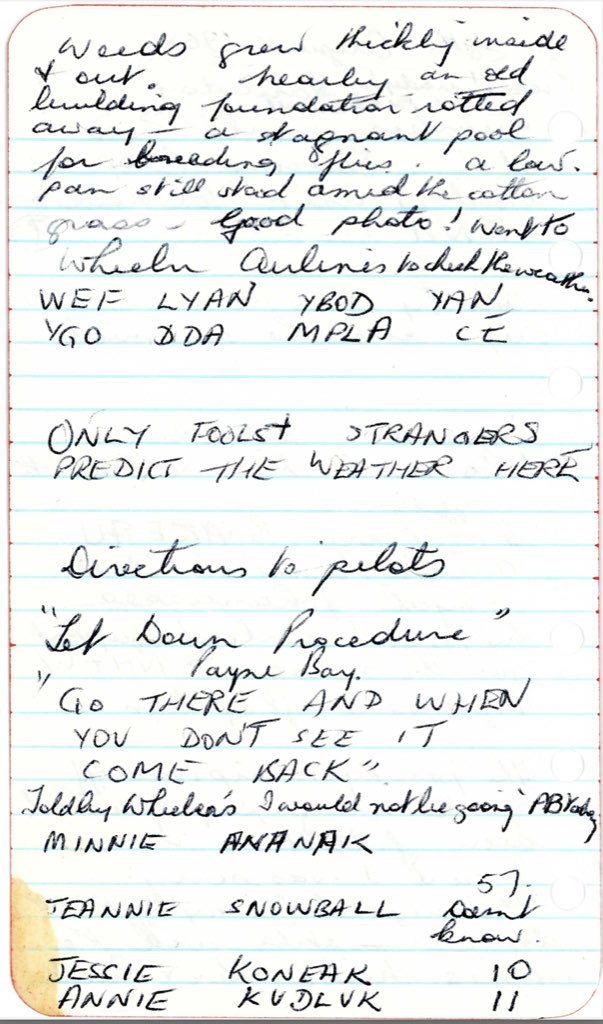
Dalhousie University Archives,
Diary of Barbara Hinds, Accession 2009-003
Like Hinds, Jillian Hess noted Charles Darwin, in her Re-Noted post:
Some of you might remember my post on Jim Henson’s diary of single-line entries. But he wasn’t the only one to use this method.
Like Henson, Charles Darwin also kept a diary filled with one-line entries. From 1838-1888, Darwin recorded his life in a single diary. In general, he notes professional events on the left-hand pages, while he reserves the right-hand pages for personal notes.
My father, who died in 2019, was also a single-line-entry diary writer.
Once, a few years before he died, I asked him what he wanted done with his diaries after his death. “Throw them away,” he said. He didn’t think they’d be of any interest or value, and perhaps, though they don’t contain anything salacious or revealing, he didn’t like the thought of us knowing that on such and such a day he was pissed off at Mom.
After 1990, Dad switched from keeping a diary in pencil to using one long Microsoft Word file. When I found the file on his desktop after he died, I discovered he’d password-protected it. His frugality played to my hand in this regard, however: he hadn’t updated Word in a long, long time, so this file was of an era where cracking the password was trivial. Which is how we can, today, read his diary entries for the 28 years between 1990 and 2018, 2.2 million words in total.
This is how I know that, on January 29, 1990, he cleaned his office; on the same day a year later, in 1991, he “missed French class and used time to skim St. Lawrence contract terms of reference and discussed with Stephane by phone.”
In 1992, he “wrote monthly report”; in 1993 he was “home sick”; in 1994 he a Mom had dinner out while the computer backup at Mom’s library ran; in 1995 it was “some difficulty in getting the Compaq trackball mouse to work, finally resolved.”
On this day in 1999, Mom retired from her library position, and we all gathered at their house to surprise her; Dad noted “great dinner and chatted till about 2300 when we all went to bed exhausted.”
Two years later, “further on the polygon, the polygon coords used in the NAD83 maps of Trow cores when converted do not agree with the NAD27 coords from mplot,” an entry you could spend hours trawling Wikipedia to understand.
Dad’s 2018 entry for January 29, the last January 29 in the file, mentions some medical issues, a visit to the mall, cleaning up his email, returning a knife sharpener to Canadian Tire. He went to bed at 11:45 p.m.
I don’t learn much about my father by reading his diary. Looking at significant events in our family’s history, there’s sometimes a one-line mention, sometimes nothing. There’s scant introspection; nothing revealed. But I find them fascinating nonetheless; like wearing the L.L. Bean wool sweater of his that I keep in my closet still, when I browse them I feel a connection to him. There’s something about the workaday mechanics of his life being revealed that lets me invoke the memory of him more powerfully.
In her Your Daily Diary Will Teach You to Hear, Seem and Remember the World Around You, Lynda Barry describes what goes into your diary:
What goes into your diary are things that you noticed when you became present—that is to say when the hamster wheel of thoughts and plans and worries stopped long enough for you to notice where you were and what was going on around you.
I realize, reading this, that it’s that very thing that draws me close to Dad when I read things like “called Cas, more progress with the baby, Mike’s move went well.” These are contrails of moments of presence in his life: a call to my mother, a thought toward Olivia, an another for brother Mike, things he thought important enough to write down.
Perhaps, years from now, if these words survive, someone will take note that, on this day, I fell into an elephant and diary rabbit hole, and took several hours and 2,000 words to write about it. And maybe, if that person is you, you’ll feel a small kinship.
Hello!
The Chaissons—seemingly all of them—are holding a monthly concert at The Pourhouse in Charlottetown to raise money to build new washrooms at the Rollo Bay Fiddle Festival grounds.
Lisa and I went yesterday, to a session featuring Dara Smith Macdonald and Adam Young. It was rollicking in the way that such things are. There were many impossibly adorable kids rambling around; step dancers were called up, some enthusiastically and some feigning reluctance; there was lyrically beautiful music, and scads of jigs and reels (we admitted to each other, later that night, that we didn’t know the difference).
The collective power of the Chaissonery had been mustered to form an impressive raffle prize that included everything just short of an guest spot on an East Pointers album: running with Stan, studio time with Brent, a fiddle lesson with Tim. Tickets were $40, and we convinced each other to invest. Our number was 836022; the winning number was 836020. So close.
On the way down the stairs at the end of the night, I overheard a couple coming down behind us: “That’s what Joe Pete might have said…,” one said to the other. If there had been any doubt, I knew then exactly where we were.
Olivia and I went out for lunch at Churchill Arms on Tuesday, the fourth anniversary of Catherine’s death, to spend time with each other and to raise a glass.
Grief still lives inside us, but its edges are no longer as sharp as they once were (2023, 2022, 2021); I took a photo of Olivia on the occasion, and she took a photo of me, and I think you can see the lack of sharp edges in our faces.
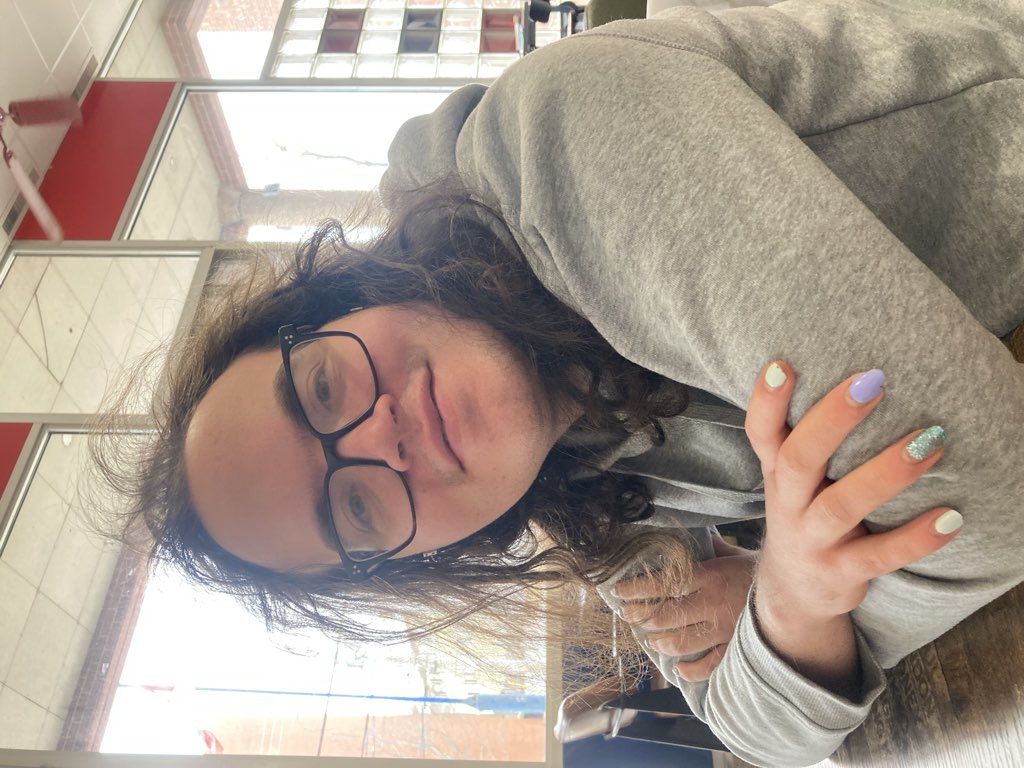
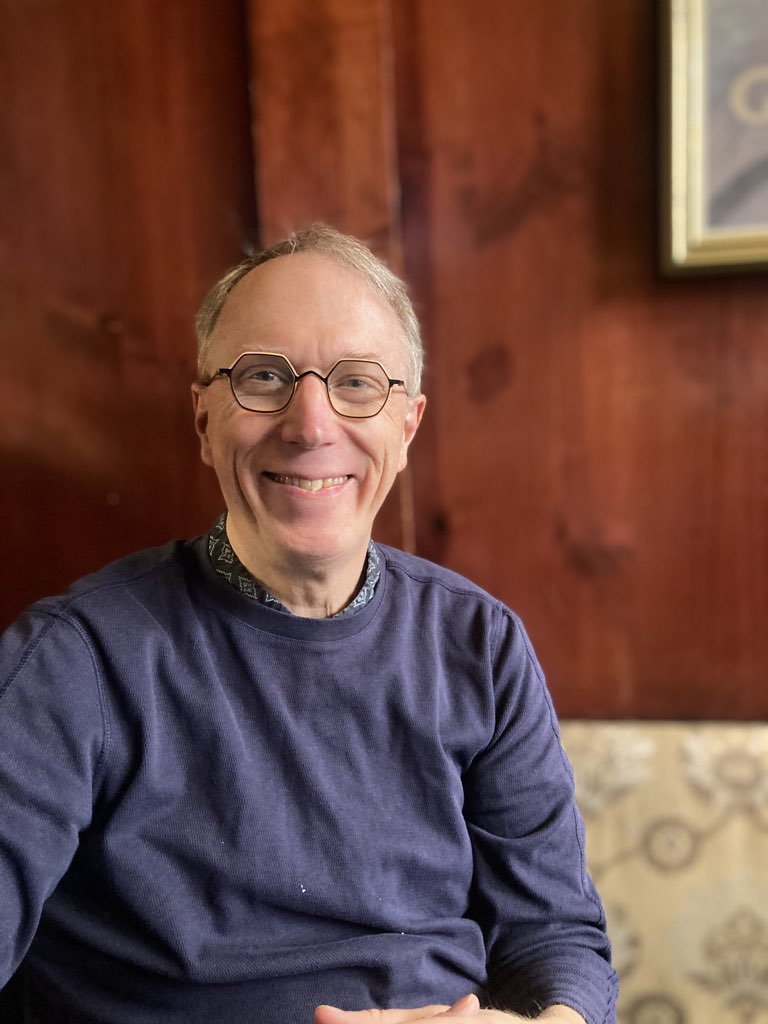
A.J. Daulerio, in The Place Where the One You Lost Resides (via Search Engine), writes about going to a meeting:
On Friday, I’d decided that I’d head back to the room and re-elevate the place with a share about the growth I’d experienced in the year since my father died. There is nothing wrong with a little performance, especially with some real-deal extra heavy dead dad shit which always played so well there.
I had rehearsed my share on the ride over. In the end, I’d hit everyone with this beauty: “I was in the hospice, sitting right next to my dying father, and while I was next to him, listening to his dying breaths, I realized that had I not been sober, I wouldn’t be there.” Can you imagine all the satisfying “Mmmmmmmms” I’d get back from the people in that room? It would sound like a knocked-over beehive.
And then I imagined how good it would feel when all the teary-eyed men would come over to shake my hand afterward. “Thank you for that, A.J.,” they’d say. “You’ve changed me.” I wanted that ego boost. I thought I deserved it—I thought the lifeless room deserved it. It was the one-year anniversary of my father’s death so it was my day to be a Higher Power.
But no one called on me. I raised my hand from the top of the hour until the newcomer break, but no one called on me even when I was glaring right at people–practically through them–to convey that I had an urgent need to share and that I was the most important person in the room. Did they not know who I was? That I was one of the longest-tenured, most scintillating members—“a giant in this program,” is how one fellow described me.
I was not, of course. I never am. I did not get what I wanted—all the attention and praise and service highs to help me process my grief. Instead, I got nothing.
I didn’t say a word but still got exactly what I needed. Funny how it works.
Progress, not perfection, et cetera.
I recognize myself in those words.
In December I went to a meeting of the Hospice PEI grief support group. I hadn’t been to a meeting in more than a year, but the Zoom invitations kept coming, and, with the 4th anniversary of Catherine’s death coming up soon, I imagined that I could use a top-up, so I joined.
It wasn’t helpful. I didn’t get what I needed. I felt icky when it was over.
I went into the meeting with the performative-wise-elder attitude that Daulerio describes, dispensing tactical homilies in service of my own grief processing. I thought this was “okay” because I was being honest and open about my feelings (I was) and because I was listening deeply to others (I was).
The final stanza of “Our Promise,” which is read at the beginning of each meeting, is:
Support means I will walk with you.
I will not try to change you or how you feel.
I will simply be here beside you.
In my spinning my grief tales into valuable life lessons for others, I wasn’t walking with them, I was seeking affirmation, a dose of “those are lovely, thoughtful words, Peter.”
In trying to use my experiences, my openness, for the good and benefit of others, I realize how that I was trying to change them, and how they felt, by way of proving, to myself, that my stories had transformed me. Like Daulerio, I was looking for “praise and attention and service highs.”
Unlike Daulerio, I didn’t have the luck of saying nothing and realizing that’s actually what I needed.
My friend Thelma is my inspiration when it comes to home appliance repair: it’s because of Thelma—and because of DIY DNA inherited from my father—that I’m inclined to open things up and see what I can see before calling a repair person (or, horror, throwing something “perfect good” away and replacing it).
Last week I took apart the pedestal fan in our bedroom: it was turning on with the switch, but the motor was straining to rotate the blades. I carefully entered its inner world, discovering, in the process, that it is little more than a souped-up version of the simple motors that would appear in our public school classrooms from time to time, used by our teachers to illustrate the combination of electricity and magnetism.
I applied a few squirts of WD-40 to clean out the gunk, and then some 3-IN-ONE oil to keep things lubricated. I put things all back together and, presto, the fan works like it used to.
But this is a story about a vacuum cleaner, not a fan.
Lisa and I inherited a Bissell upright vacuum cleaner, a rather industrial-seeming, very well-used 2260 model. The vacuum worked “perfectly well,” except that its motorized rotating cylinder—the part with brushes that touches the rug and whips dirt into the suction—wasn’t turning properly.
Repair number one, earlier in the year, involved disassembly and the revelation that the cylinder wasn’t turning because the belt that drives it was broken. I replaced the belt for under $20 with a replacement from A-1 Vacuum.
The new belt lasted for about 10 minutes.
And then snapped again.
In my grief, I put the vacuum away in the closet for a few seasons.
A few weeks ago I took it out again—it’s sand-and-salt season and the rugs deserve more—and disassembled it again.
I realized that, yes, the belt was broken again. But also that the reason the belt was broken was because the aforementioned rotating cylinder was frozen in place. WD-40 came to the rescue again: a few squirts, some additional cleanup, and the cylinder was rotating again.
I put everything back together.
And found that the vacuum wasn’t doing a very good job, even with the rotating cylinder back on the job.
It was only then that I realized that perhaps the many years of hard use had worn down the rotating cylinder to the point where brushes that might once have been bushy were no longer so.
$29.95 and a week later, I had a new thingy in my hands.
Yes, the old one was worn down:
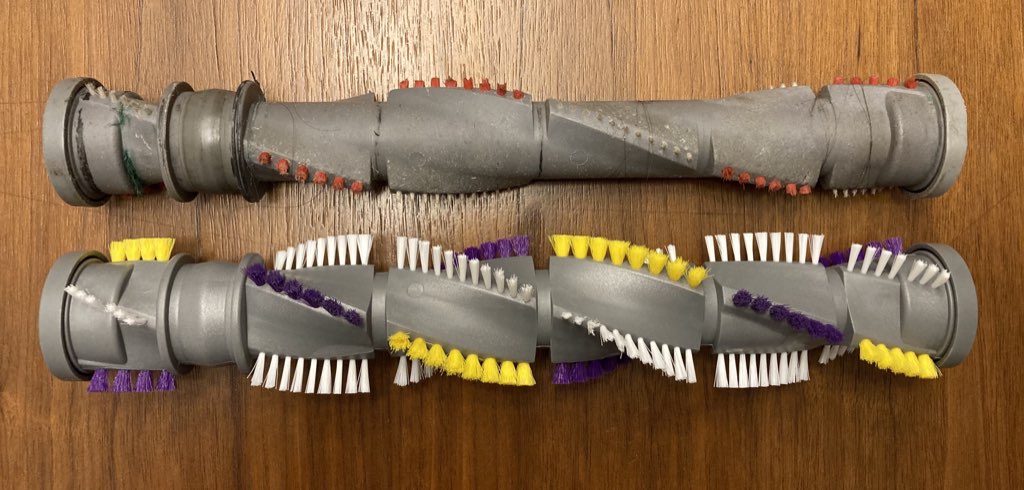
I installed the new brush in the vacuum in about 10 minutes.
And it’s like a whole new vacuum.
Not only does it clean the rugs like a dream, but it propels itself forward in a very pleasant way.
Thanks, Thelma.
Johannes Lichtman was an invited guest at a creative writing group at CIA headquarters. He wrote about the experience in The Paris Review.
Related: The New York Times reported, in 2007, that The Paris Review was founded as a cover for CIA agent Peter Matthiessen.
Six years ago I switched my mobile phone provider from Eastlink to Public Mobile.
I have been a happy customer ever since.
Public Mobile is a bargain basement “you’re on your own” brand of Telus (one of the big three mobile providers in Canada). The brand uses the same Telus Mobility network as the other Telus brands, it’s just that service and support is entirely online, and primarily self-service (“go look it up in the forum”).
Since I switched in 2018 service has only gotten better and cheaper: I started out paying $40/month for a plan that included unlimited Canada-wide calling and texts, plus 4.5GB of 3G data; I just updated my plan today to one that’s the same price, but now includes 60GB of 5G data:
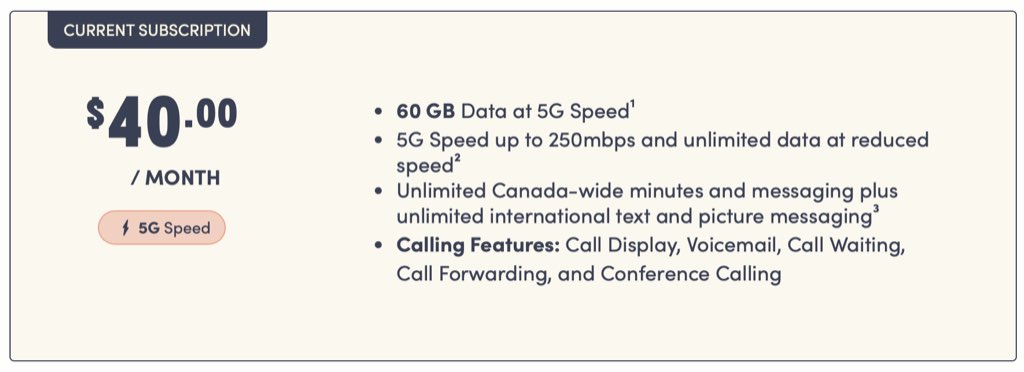
I switched plans today (oddly, saving $5/month and gaining 10GB of additional data) because I was doing an audit of our household mobile plans, focusing on Lisa, who had been with Bell Mobility for a long time.
I ended up switching Lisa to a Public Mobile plan that’s $34 for 50GB of 5G data, saving her $52 a month over what she was paying Bell. The switching process, which included porting her old mobile number over to Public Mobile, was painless, and done entirely within the Public Mobile iOS app, taking advantage of her iPhone’s eSIM abilities, which meant we didn’t even need to leave the house to switch. The number porting was completed in less than an hour.
–– THIS IS ADVERTISING ––
Here’s an affiliate link that, if you click, and then follow through and create a Public Mobile account, will chop $1 off my own Public Mobile bill, and give you a $10 credit (thank you to the three people who’ve used that affiliate link over the last 5 years: much appreciated).
After spending the early winter working on This Box is for Good, Lisa and I are turning our attention to new print projects, and part of this includes getting the shop set up with the right tools, inks, and whirligig’s to allow us to print what our imaginations dictate.
Today I wanted to take a new set of Ternes Burton register pins out for a ride: I’d never used them before, and I wanted to see how they worked.
I needed something to print, and the something needed to require registration. Remembering that Olivia used to call the “leap year” the “leapy ear,” I decided to print an ear as a reduction print.
I sketched an ear onto a small lino block, and set aside some areas to be grey and some to be black. I carved away everything that was to not print at all, and then used the block to print a layer of grey. Next I carved away everything I wanted to leave grey, leaving just want I wanted to overprint in black and printed the black layer.
The job of the register pins is to keep the paper in exactly the same place from print to print, so that the colours “line up” in the right way (here’s a great video that illustrates their utility). The register pins did exactly what they’re supposed to do, and the registration across the edition of five prints was bang-on.
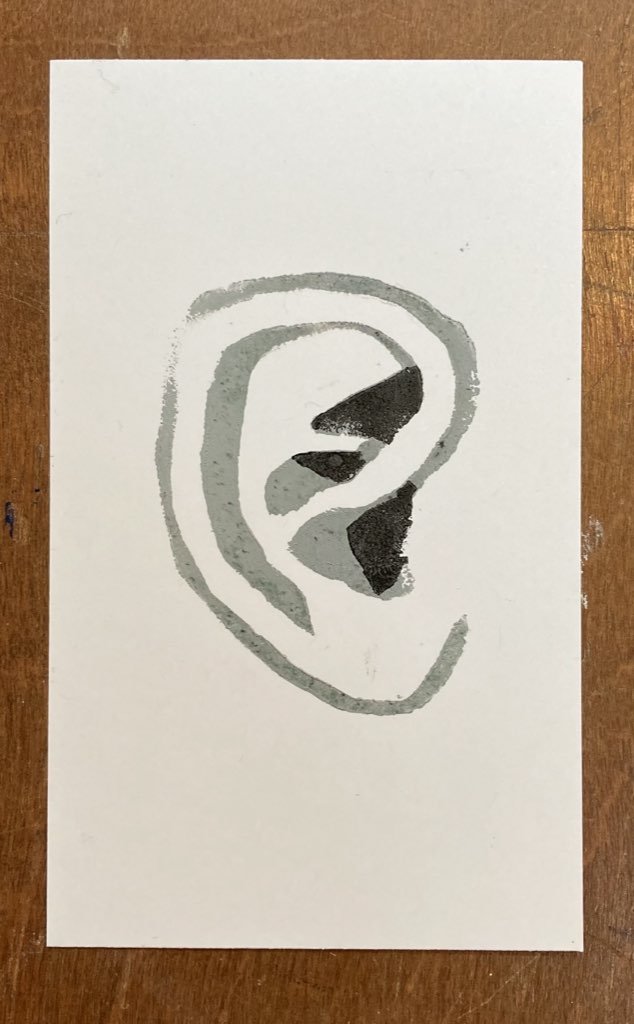
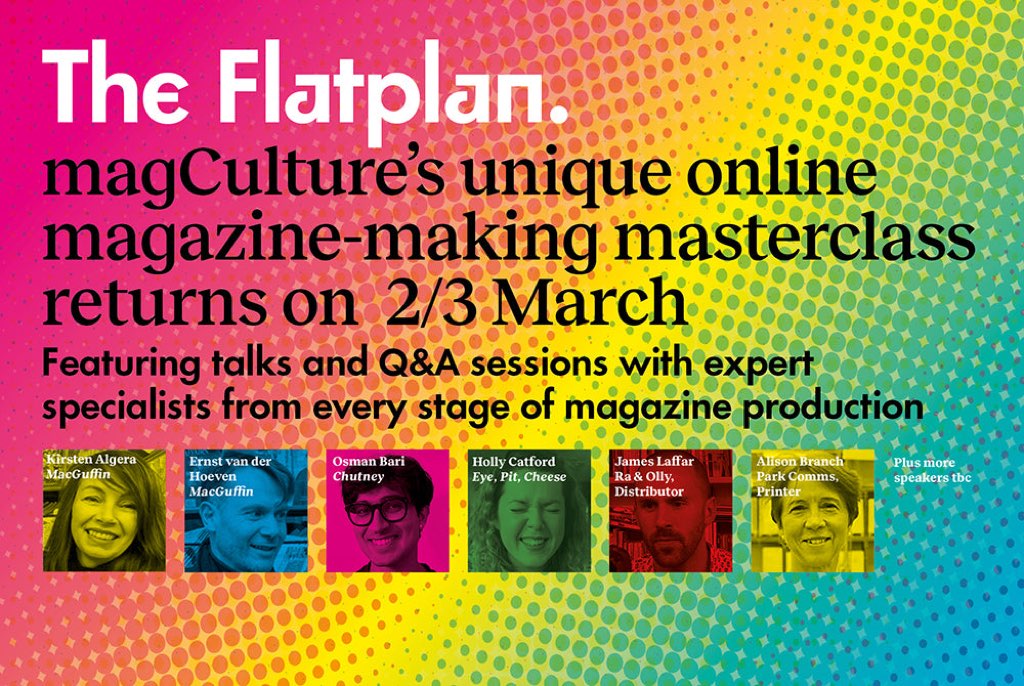
 I am
I am